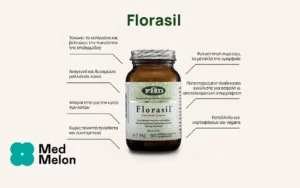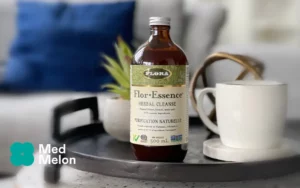Scientific Names of Bearberry Leaf:
Actostaphylos uva-ursi (L.) Spreng. [Fam. Ericaceae]
Forms:
Bearberry leaf tea; Bearberry leaf extract standardized for arbutin
Traditional Usage:
– Alkaline-forming (urine)
– Antibacterial
– Anti-inflammatory
– Antiseptic (urinary)
– Bladder and Kidney Catarrh (Mucous)
– Inflammation (Lower Urinary Tract)
– Immuno-inflammation (Bone and Joint, etc.)
– Urinary Tract Infections (UTIs)
Overview:
The leaves of bearberry, Actostaphylos uva-ursi (L.) SPERNG. [Fam. Ericaceae] contain a compound called arbutin that is metabolized into the antibacterial compounds hydroquinone glucuronide and hydroquinone sulphate. Bearberry leaf tea is listed in the German Pharmacopoeia as a urinary disinfectant for the treatment of bladder and kidney catarrh (mucous) and inflammation. It is noted by German authorities that the tea works best against UTIs when urine is kept alkaline by eating a generous plant-based diet and taking sodium hydrogen carbonate (bicarbonate). Many naturopaths recommend bearberry leaf tea and extract as the most effective natural cure for UTIs. One of the important mechanisms of action of bearberry leaves is their ability to influence the surface characteristics of microbial cells and thereby their putative virulence properties. In a study of the adhesion of microbes on host cells (decisive in the development of Gram-negative microbe-induced infections) it was determined that urinary tract infections can be prevented by inducing surface hydrophobicity of the microbial cell (i.e. preventing bacteria from adhering to urinary system membranes). The influence of aqueous extracts prepared from bearberry leaves on hydrophobicity of forty E. coli and twenty Acinetobacter baumannii strains was investigated and it was found that the decoction of bearberry remarkably increased the hydrophobicity of both microbial species. Interestingly, this study also found that the bactericidal action of the tea was relatively low. However, another study found that the extract of bearberry leaf possessed a remarkable bacteriostatic activity on ten Helicobacter pylori strains. The researchers of this study concluded that tannic acid seemed to be the component of bearberry aqueous extracts with the highest activity to decrease cell surface hydrophobicity as well as in antibacterial activity against H. pylori. Bearberry leaf extract and arbutin are also therapeutic against immuno-inflammation (such as that sometimes related to painful bone and joint inflammations).
Active Ingredients:
The leaves of Bearberry contain: At least 6% quinones including largely arbutin (5-15%) (arbutoside) and methylarbutin (glycosides), hydroquinone mono-glucoside, and small amounts of piceoside (a glycoside); 6-7% tannins (with a range between 6-40%) including approximately 15-20% catechol and gallo-tannins; arbutin gallic acid ester; flavonoids including myricetin, quercetin and their glycosides including hyperin, hyperoside, isoquercitrin, myricitrin and quercitrin; terpenoids and triterpenes including alpha amyrin, beta amyrin, lupeol, uvaol, ursolic acid, and a mixture of mono and di- ketonic alpha amyrin derivatives; iridoid glycoside monotropein; phenol-carboxylic acids including gallic acid, p-coumaric and syringic acids.
Suggested Amount:
Unless otherwise prescribed, 10 grams (approximately five level teaspoons) of cut or powdered bearberry leaves (corresponding to 400-700mg of arbutin) are taken daily. Boiling water (ca. 150ml) is poured over the bearberry leaves and after ten minutes strained. Bearberry leaf tea is taken 3-4 times per day. Bearberry leaf tea is not recommended for prolonged use, due to the high tannin content of the leaves and hydroquinones that may damage the liver. One Teaspoon = ca. 2 grams.
Drug Interactions:
Bearberry leaf tea and related preparations should not be given at the same time as acid-forming drugs that will cause an acid urine, as this will prevent the successful treatment of UTIs.
Contraindications:
Bearberry leaf tea is not recommended for prolonged use, due to the high tannin content and hydroquinones that may damage the liver.
Side Effects:
Children and those with a sensitive stomach may experience nausea and vomiting from bearberry leaf tea and extracts. Hydroquinones can be toxic if taken in large quantities: 1g (equivalent to 6-20g plant material) has caused tinnitus, nausea and vomiting, sense of suffocation, shortness of breath, cyanosis, convulsions, delirium and collapse. A dose of 5 g (equivalent to 30-100g plant material) has proved fatal. There can be hydroquinone poisoning with long-term use of bearberry leaf tea and concern about liver damage caused by long-term high tannin exposure, so bearberry is not recommended for prolonged use.
References:
Annuk H, Hirmo S, Turi E, Mikelsaar M, Arak E, Wadstrom T. 1999. Effect on cell surface hydrophobicity and susceptibility of Helicobacter pylori to medicinal plant extracts. FEMS Microbiol Lett 1999 Mar 1; 172(1): 41-5.
Kubo M, Ito M, Nakata H, Matsuda H. 1990. Pharmacological studies on leaf of Arctostaphylos uva-ursi (L.) Spreng. I. Combined effect of 50% methanolic extract from Arctostaphylos uva-ursi (L.) Spreng. (bearberry leaf) and prednisolone on immuno-inflammation. Yakugaku Zasshi. 1990 Jan; 110(1): 59-67. [Japanese].
Newall CA, Anderson LA, and Phillipson JD. 1996. Uva-Ursi. In Herbal Medicines. A Guide for Health Care Professionals. The Pharmaceutical Press, London, pp. 258-259.
Turi M, Turi E, Koljalg S, Mikelsaar M. 1997. Influence of aqueous extracts of medicinal plants on surface hydrophobicity of Escherichia coli strains of different origin. APMIS 1997 Dec; 105(12): 956-62.
Wichtl M (ed). 1994. Uvae ursi folium – Uva ursi leaf. In Herbal Drugs and Phyto-pharmaceuticals. (English translation by Norman Grainger Bisset). CRC Press, Stuttgart, pp. 510-512.




